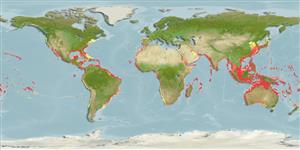分類 / Names
共通名の | 類義語 | Catalog of Fishes(部類, 種) | ITIS | CoL | WoRMS | Cloffa
Environment: milieu / climate zone / depth range / distribution range
生態学
海 関連する礁; 深さの範囲 2 - 200 m (Ref. 5951), usually 2 - 35 m (Ref. 40849). Subtropical; 37°N - 39°S, 8°E - 55°W (Ref. 55210)
Circumtropical in distribution. Western Atlantic: Canada (Ref. 5951), Florida, USA and the Bahamas to Brazil (Ref. 7251). Eastern Atlantic: 30°N to 23°S (Ref. 6951); also South Africa (Ref. 4423). Western Indian Ocean: southern Red Sea to Madagascar, Reunion and Mauritius (Ref. 53568). Pacific Ocean: southern Japan south to Lord Howe Island and east to the Hawaiian and Easter islands (Ref. 37816). Also from southern California, USA to Colombia (Ref. 11482) and the Galapagos Islands (Ref. 5227).
サイズ / 重さ / 年齢
Maturity: Lm ? range ? - ? cm
Max length : 50.0 cm TL オス/雌雄の選別がない; (Ref. 7251); common length : 15.0 cm TL オス/雌雄の選別がない; (Ref. 55763)
背面の脊椎 (合計) : 0; 背鰭 (合計) : 13 - 15; 肛門の骨: 0; 臀鰭: 13 - 15. Pelagic juveniles with spots, particularly prominent on belly; adults with dark blotches across back and spots between the blotches; fins without spots (Ref. 4423). 14 to 16 spines in an approximate row between snout and origin of dorsal fin; with a large brown bar above and below each eye; a broad transverse brown bar on occipital region of head (Ref. 13442).
Inhabit shallow reefs to open, soft bottoms. Also in areas with rocky substrata. Sometimes form groups (Ref. 9710, 48637). Occur on open muddy substrates as well as on rich soft-bottom and coral reefs. Juveniles often with floating Sargassum rafts. Young and sub-adults may form small groups (Ref. 48637). Benthopelagic (Ref. 58302). Juveniles pelagic to about 6-9 cm. Solitary. Feed on mollusks, sea urchins, hermit crabs, and crabs at night (Ref. 9680). Relatively poor swimmers (Ref. 9710). Used in Chinese medicine (Ref. 12166). Captured at the surface using a hand net (Ref. 26165).
Life cycle and mating behavior
Maturities | 繁殖 | Spawnings | Egg(s) | Fecundities | 幼生
Leis, J.M., 1984. Diodontidae. In W. Fischer and G. Bianchi (eds.) FAO species identification sheets for fishery purposes. Western Indian Ocean fishing area 51. Vol. 2. (Ref. 3393)
人間に対する脅威
Reports of ciguatera poisoning (Ref. 30303)
Human uses
水産業: 少数商業の; 水族館・水槽: 商業
用具
特記事項
XMLをダウンロードして下さい
インターネットの情報源
Estimates based on models
Preferred temperature (Ref.
123201): 21.5 - 29, mean 27.3 °C (based on 2666 cells).
Phylogenetic diversity index (Ref.
82804): PD
50 = 0.5313 [Uniqueness, from 0.5 = low to 2.0 = high].
Bayesian length-weight: a=0.05888 (0.02847 - 0.12178), b=2.80 (2.61 - 2.99), in cm total length, based on LWR estimates for this species & (Sub)family-body (Ref.
93245).
栄養段階 (Ref.
69278): 3.9 ±0.2 se; based on diet studies.
Generation time: 2.1 ( na - na) years. Estimated as median ln(3)/K based on 1
growth studies.
回復力 (Ref.
120179): 高い, 15か月以下の倍増期間の最小個体群 (Preliminary K or Fecundity.).
Fishing Vulnerability (Ref.
59153): Low to moderate vulnerability (27 of 100).
Nutrients (Ref.
124155): Calcium = 20.4 [7.6, 77.9] mg/100g; Iron = 0.566 [0.268, 1.420] mg/100g; Protein = 19.3 [17.1, 21.5] %; Omega3 = 0.201 [0.104, 0.390] g/100g; Selenium = 24.7 [10.4, 57.1] μg/100g; VitaminA = 22.8 [5.5, 106.7] μg/100g; Zinc = 0.535 [0.334, 0.862] mg/100g (wet weight);
